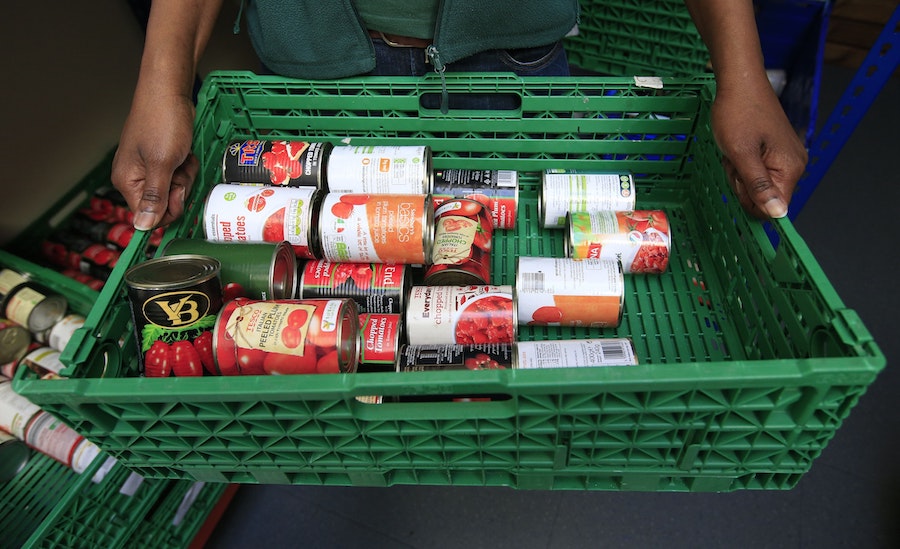7 ways you can help combat food poverty in your area
It’s shocking but true: one in five people in the UK live below the poverty line. Foodbank use has been rising (586,907 three-day emergency food supplies were given to people in the first half of 2017, a 13% increase on 2018), and with the festive season approaching, it means a lot of empty cupboards, and even emptier bellies.
Samantha Stapley, head of operations at The Trussell Trust (trusselltrust.org), says: “Foodbank use is increasing and we’re worried people will be going hungry over Christmas.
Foodbank use is set to be at record high nationwide and benefits issues&low income are to blame. We’re asking the Govt to take action >> pic.twitter.com/r9Pp5WeV2Z
— The Trussell Trust (@TrussellTrust) November 7, 2017
“The stories you hear at foodbanks can be heartbreaking – mums who are going hungry for days so their children can eat, or families left to sit in the dark so they can have a hot meal. But foodbanks offer food, and most importantly, hope, to people in crisis.”
So how can you help? “There are lots of ways,” says Samantha, “from donating food, to donating time, to donating money. Christmas is a really busy period and foodbanks are sustained by generous donations from the public, so we’d urge people to go on our website, find their nearest foodbank, and see what they might need.”
Here are a few more ways you can contribute.
1. Start a food bank
Your area may not already have a foodbank you can donate to, but that doesn’t mean it doesn’t need one. All you require is a local community centre or church to set up in, and the backing of a registered charity. For instance, join The Trussell Trust Foodbank Network and they’ll provide training, expertise and ongoing logistical support (contact 01722 580171 or [email protected] for more details).
2. Volunteer with FoodCycle
If you love cooking, hate waste, and enjoy feeding people, hunt down your nearest FoodCycle branch (foodcycle.org.uk). Across the country, they host free community dinners for people in need – of both food and conversation – and the meals are whipped up using surplus food from supermarkets and local independent food stores. You can get involved even if you’re a terrible cook; they always need volunteers to collect produce from retailers, serve food and host meals.
3. Over-shop for a good cause
If you can afford to pick up an extra couple of cans of tinned tomatoes, two packets of pasta instead of one, or double amounts of cereal, do it and make use of foodbank drop off points at most major supermarkets. It’ll save making a separate trip to your local foodbank, and you can contribute non-food stuffs too – toiletries, nappies and sanitary products are always needed.
4. Support – or start – a Community Fridge
Changing hearts and minds about food surplus, waste and sharing every day.
It helps there is delicious food from Yeotown in the fridge. pic.twitter.com/RUvix2Zdeg
— The People’s Fridge (@PeoplesFridge) September 20, 2017
If you’ve not yet stumbled across your local community fridge, go seek it out. Offering a space for residents and businesses to share surplus fresh food or spare items nearing their sell by date, the produce is then free to take for people who want or need it. And if your community hasn’t got a fridge yet, launch one yourself. The Community Fridge Network offers support, as well as a ‘how to’ guide for getting started at hubbub.org.uk/Event/community-fridge-network.
5. Donate food from your business – or encourage others to
Thank you to all the great volunteers who help us to tackle food waste and fight hunger here @FareShareUK #feedpeoplefirst #volunteersweek pic.twitter.com/a7QniRorDW
— FareShare London (@FareShareLON) June 6, 2017
Organisations like FareShare (fareshare.org.uk) and the app FoodCloud put retailers in touch with food banks and food waste charities, to redistribute excess produce so it gets to people who need it. So, if you run a cafe or restaurant, or know someone who does, get in touch to set up food-sharing partnerships – or lobby your local supermarkets to sign up.
6. Share food you’ve grown
If you’re lucky enough to have an allotment, and are overwhelmed with everything from squashes, onions and potatoes, to kale, berries and herbs, don’t whack the excess on the compost. Instead, why not donate your surplus fruit and veggies to charities like FoodCycle or a community fridge?
If you don’t have any outdoor space, volunteer at a local community garden or allotment instead. You’ll be able to feel the dirt beneath your fingers while being trained up as a pro home-grower, and the results of your digging and sowing are likely to be shared between your fellow gardeners and the wider community. Contact your local council for details of your nearest allotment and visit farmgarden.org.uk to find out about community farms and gardens.
7. Fundraise
Tesco donates £1 for every fresh turkey sold to charities @FareShareUK & @trusselltrust to help people in need https://t.co/VAgOdmBDgw
— Tesco News (@tesconews) November 6, 2017
Whether you host a bake sale, run a coffee morning, embark on a long distance run, or ask friends to sponsor you to eat on just £1 a day, there are lots of ways to help raise funds – it just requires a little of your time.
The Press Association
Latest posts by The Press Association (see all)
- Prince William posted a heartfelt birthday message to ‘most incredible wife and mother’ - January 9, 2025
- Birthday wishes for Catherine from royal family as the Princess of Wales turns 43 - January 9, 2025
- Maple Cinnamon Granola - January 8, 2025
- 8 things your feet can tell you about your health - January 8, 2025
- 9 ways to look after your emotional health better in 2025 - January 7, 2025





















